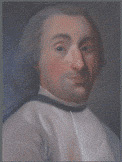| Profile | Major Works | Resources |
Abbé Nicolas Baudeau, 1730-1792.

French cleric who later converted to Physiocracy, and became one of its principal disseminators.
A native of Amboise, Nicolas Baudeau was elevated to a regular canon and teacher of theology at the Abbey of Chancelade. He was subsequently called to Paris by the Archbishop de Beaumont.
Abbé Baudeau started off as a Neo-Colbertiste (e.g. in the Idées d'un citoyen series, 1763-65). In November 1765, the Abbé Baudeau founded a bi-weekly magazine, entitled Ephémérides du Citoyen: ou Chronique de l'ésprit national, in order to open up a dialogue on economic questions. Le Trosne published an article in the Ephémérides promoting the Physiocratic viewpoint, so Baudeau thought it fair to publish a series of articles defending the Neo-Colbertiste position in the Physiocrats' own rag, the Journal d'agriculture, du commerce et des finances. DuPont de Nemours, the editor of the Journal, published Baudeau's article in 1766, but accompanied it with his own comments questioning Baudeau's arguments.
To clarify these questions, the fair-minded Baudeau met with DuPont de Nemours and, overnight, was converted to the Physiocratic point of view. He relaunched the Ephémérides du Citoyen as a monthly in 1767 with a new sub-title, Bibliothèque des sciences morales et politiques. In1768, Baudeau departed for Poland on ecclesiastical affairs, and handed over the editorship of the Ephémérides to DuPont de Nemours. Under the editorship of DuPont de Nemours, the Ephémérides became a doctrinal bastion of the Physiocratic school.
Besides his journal, Baudeau's principal works are his exposition of the "loi naturelle" (1767), his discussion of the single tax (1768) and his Première introduction (1771) defending Physiocratic doctrines against the critiques of Galiani.
In November 1772, the government closed down the Ephémérides du Citoyen. In 1774, upon the ascension of Turgot as controller-general, Turgot helped Baudeau helped launch the Nouvelles Ephémérides Economiques. This new venture was closed down in 1776, with Turgot's fall from grace. Baudeau attempted to resurrect the journal in 1788, but went mad soon afterwards.
Two interesting asides about Baudeau must be mentioned. First is his 1767 article, written at the height of a French famine, when he recommended that the wide-spread adoption of cheap mills would enable cheaper bread to be produced and sold. Mirabeau followed up on his suggestion and the "cheap mills" movement was born. In 1776, Baudeau assaulted the thirty-year old law that required that Paris butchers take their loans exclusively from the Caisse de Poissy (which, accordingly, charged extortionate interest rates). Baudeau was hauled before the Parlement of Paris, but successfully defended himself and had the law overturned. He was carried through Paris on the shoulders of rejoicing butchers.
In 1785, Baudeau authored an extensive critique of the policies of Jacques Necker, and urged several reforms on public administration. Baudeau is said to have descended into mental illness sometime after this, and to have died by suicide (throwing himself out of the window of a sanitorium around 1792).
| HET pages |
|
Resources on Abbé Baudeau
|
All rights reserved, Gonçalo L. Fonseca
